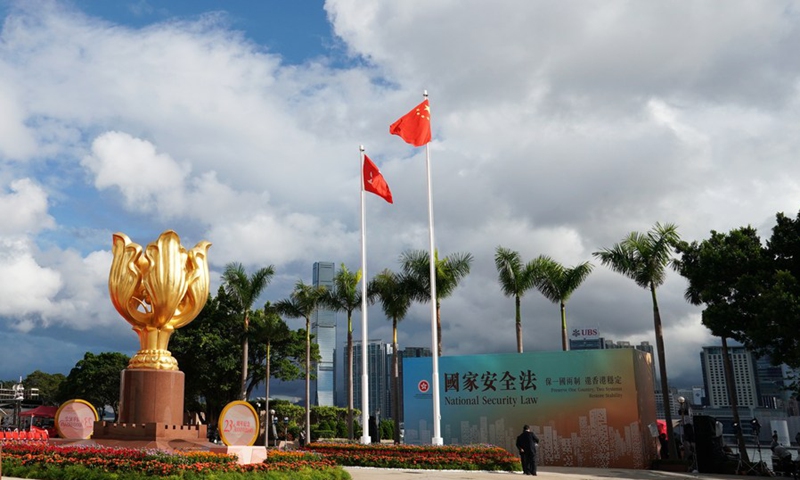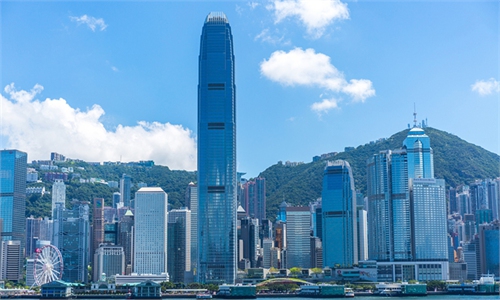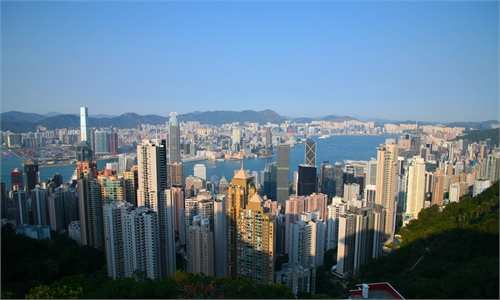
Photo taken on July 1, 2020 shows the Golden Bauhinia Square after a flag-raising ceremony held by the government of the Hong Kong Special Administrative Region in Hong Kong, south China.(Photo: Xinhua)
The upcoming electoral reform in Hong Kong does not touch on the question of democratic processes in Hong Kong, a senior Chinese official said on Sunday, refuting some critics in Western countries and regions, including the US and EU, on the reform, saying that no side cares more about the city's democratic development, stability and prosperity more than the Chinese central government.
Improving Hong Kong's electoral system and implementing the principle of "patriots governing Hong Kong" is a constitutional, legitimate, just and reasonable act, Chinese State Councilor and Foreign Minister Wang Yi said on Sunday at a press conference on the sidelines of the ongoing two sessions in Beijing.
Improving the city's electoral reform is a legitimate move that is in line with China's Constitution, and improving the system and implementing the principle of "patriots governing Hong Kong" is a real-time necessity for pushing forward the "one country, two systems" principle, Wang told the press conference, noting that the move is also the execution of power and responsibility authorized by the country's top legislature.
"In the colonial era, Hong Kong had no democracy at all. Twenty-four years since Hong Kong's return, no side cares more about the city's democratic development, stability and prosperity than the Chinese central government," Wang said.
The remarks came amid rising criticism in the West over the recently unveiled draft decision to overhaul the Hong Kong electoral system by the National People's Congress (NPC), China's top legislature, during the ongoing two sessions with the aim of fixing existing loopholes and effectively implementing the political principle of only "patriots governing Hong Kong."
In the detailed draft decision released at the opening of the annual session of the NPC, the Chinese top authority outlined major steps to follow in amending the Basic Law-related legislature by performing constitutional rights under the "one country, two systems" baseline, redefining the constitutional order of Hong Kong as one of China's special administrative regions (SAR), and hinting at future measures, including expanded public participation and whole-process scrutiny of candidacy in local elections.
However, such action, called by senior Chinese officials as constitutional and legitimate, was interpreted by some Western media such as Reuters and Bloomberg as the "end of the road for Hong Kong's democratic dream" and "rejection to democratic institutions." The move was also being slammed by the EU and the US, claiming that the reform plan broke "commitments" made by the Chinese central government in maintaining the Hong Kong's high degree of autonomy and that it is a "direct attack" on its democratic processes.
A question of subversion
"It's not a question about Hong Kong's democratic process, it's a question of subversion," Tam Yiu-chung, a member of the NPC Standing Committee from Hong Kong delegation, told the Global Times on Sunday, noting that this was also a point of view he talked about when Chinese Vice Premier Han Zheng met with Hong Kong delegates to the NPC on Sunday morning.
After meeting with members from the Hong Kong to the 13th National Committee of the Chinese People's Political Consultative Conference (CPPCC) and Carrie Lam, chief executive of Hong Kong on Saturday, Han Zheng, who is also a member of the Standing Committee of the Political Bureau of the Communist Party of China Central Committee and head of the central leading group of work on Hong Kong and Macao, met with Hong Kong deputies to the 13th NPC on Sunday morning, talking about a series of issues which included loopholes in regional governance, anti-epidemic work and imminent political reform in Hong Kong.
Since the return of Hong Kong to the motherland, democracy in Hong Kong has been developing progressively, Tam said, referring to remarks he made during the meeting with the senior Chinese official. However, due to interference by external forces, the democratic processes have deviated from the fundamentals of "one country, two systems," particularly as some people used "democracy" as an excuse to collude with foreign anti-China forces to obstruct the Hong Kong government to implement policies and stir up social turmoil, Tam noted.
"They also advocated for 'Hong Kong independence' and tried to separate the city from the mainland, which is not a question of democracy anymore," he said.
Chan Yung, an NPC deputy from the Hong Kong who attended the meeting with Han, was also impressed by the understanding of the senior officials in the central government concerning the democratic processes in Hong Kong. "Han hopes that Hong Kong would be a true democratic society ruled by law, and he cited the Capitol Hill riots in the US as an example saying that [no one] was held accountable for similar acts that endangered national security [in Hong Kong] due to the lack of Article 23 of the Basic Law," he said.
The implementation of the national security law for Hong Kong in 2020 aimed to fix the loopholes in that sector, while electoral reform would make the city stable and prosperous in the long term, Chan told the Global Times.
"Compared to the Capitol Hill riots, storming the Legislative Council and vandalizing public facilities in Hong Kong during the social turmoil in 2019 were much more severe, and what's wrong with us in fixing our own systematic problems? The critics in some Western countries are purely making double standards," Tam said.
No end for democratic processes
While some Western media portrayed the electoral reform, following the detention of 47 anti-government political figures, some of whom are former Legislative Council lawmakers and district councilors, as Beijing's crackdown on "pan-democracy parties and different voices" and used this as a so-called strong argument claiming the democracy of Hong Kong is approaching its end, Chinese Foreign Minister Wang Yi reiterated that for civil servants and people who run public positions, pledging loyalty to their own country is a basic political ethical standard.
"This is also the case with Hong Kong. As Hong Kong is part of China as a special administrative region, loving Hong Kong is in line with loving China," Wang said.
However, among the 47 arrested for subversion, some radical political figures like former lawmaker Wong Yuk-man and Tam Tak-chi, vice chairman of the pan-democracy group People Power, have openly advocated to crack down on the leadership of the CPC, referring to it as "tyranny," and some were acting as "black-hands" behind the months-long social turmoil in 2019 with the aim of paralyzing the power of authority, which tipped the city into deep recession.
The Chinese central government has been pushing forward the democratic processes of Hong Kong in line with the actual situation. In more than two decades, Hong Kong has not done its job very well, this is to blame. And the priority for the city is to be back to the normal track, Elsie Leung Oi-sie, former deputy director of the Basic Law Committee, was quoted as saying in media reports on Sunday.
"Electoral reform does not equal a leap backward for Hong Kong's democracy," she said.




